Do Your Earnings Stack Up?
A review of the key findings from IChemE’s Salary Survey
ICHEME members have once again shared salary details to provide an understanding of key trends in earnings and benefits across the sectors that employ professional chemical engineers.
This year - for the first time - IChemE’s salary survey report is available to download for free online.
Over 2,600 members took part in the 2017 Salary Survey. Data was gathered from the five countries with the greatest concentration of IChemE members: the UK, Australia, Malaysia, South Africa and India.
Chemical engineers are earning less
The 2017 salary survey data reveals that median salaries for chemical engineers are down across four of the five countries surveyed. Chemical engineers are still feeling the impact of the oil and gas downturn.
Oil and gas has consistently been the top employment sector for chemical engineers. The Chemical Engineer reported several thousand of job losses in the sector in 2016, including at BP, Schlumberger and Shell. Job losses continued into 2017. Rigzone magazine reported in 2017 that more than 440,000 jobs had been lost in the sector. With the significant cut in jobs, more candidates are applying for fewer positions. We are currently in an employer’s market with downward pressure on salaries visible in many sectors.
As shown in Table 1, the median salary for chemical engineers in the UK was reported in the 2017 survey as £55,000/y, down from £57,000/y in 2016. Australia’s median salary was $136,000/y, a decrease from A$140,000/y in 2016. IChemE members in Malaysia reported a median salary of RM68,900, significantly down from RM114,800 last year. Meanwhile, members in South Africa reported ZAR739

India was the only country of the top five that appeared to show an increase in overall median salary. For 2017, it was reported as INR1,200,000, compared to INR1,000,000 in 2016. However, due to the much smaller sample sizes for India, Malaysia, and South Africa, caution is advised with the interpretation of these findings.
Salaries have remained consistent with the 2016 findings for those at the early stages of their career (aged under 25) in the UK and Australia. IChemE UK members under aged 25 reported a salary of £30,000 and Australia reported A$73,707, marginally higher than the A$70,000 reported in 2016. The data samples for under 25s in Malaysia, India and South Africa were too small to make accurate comparisons with the results from IChemE’s 2016 report.
Across all five countries, there were similarities in the most commonly-reported employment sectors, with oil and gas exploration and production topping the list in UK (277 respondents), Australia (90), Malaysia (46) and India (7). South Africa bucked the trend, with the petrochemicals sector employing the largest number of chemical engineers responding to the survey.
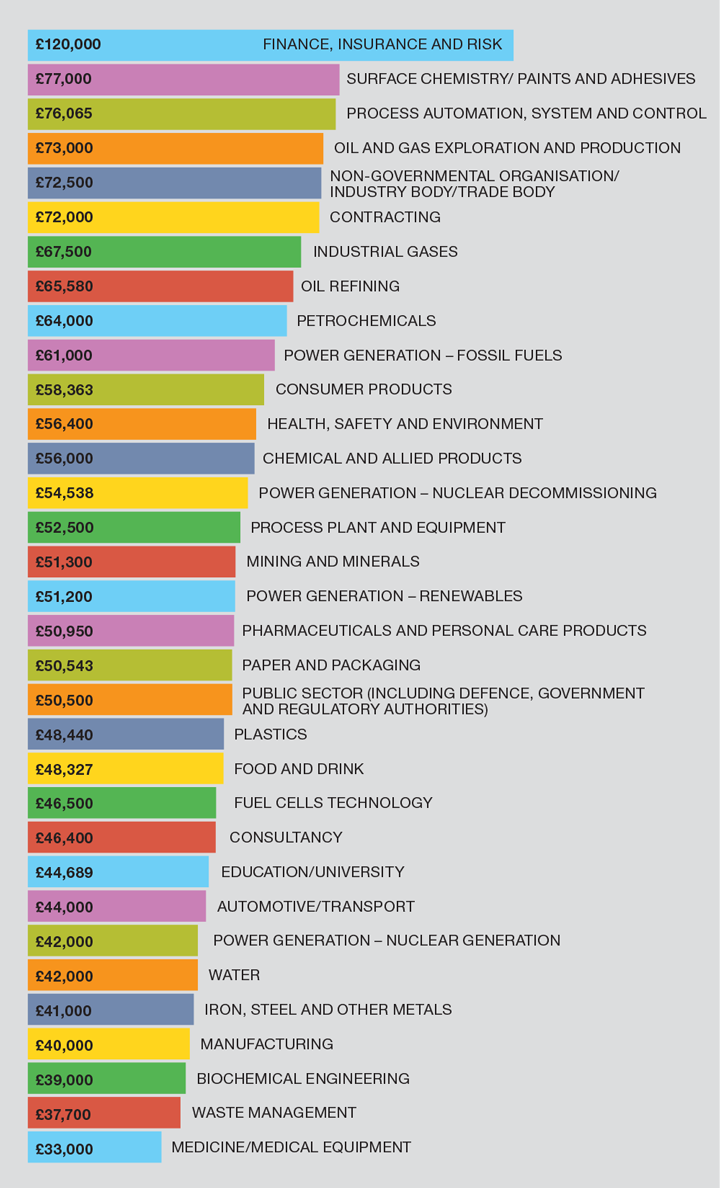
United Kingdom
Since 2006, the median salary for a chemical engineer has increased by 21%. IChemE members typically earned a median of £55,000 in 2017 – a fall of £2,000 since 2016. The median salary for those chemical engineers at the early career stage and aged under 25 is £30,000 – the same as was reportedin 2016.
Across all age ranges, the highest earning sectors were finance, insurance and risk (£120,000), surface chemistry/paints and adhesives (£77,000/y), process automation, system and control (£76,065/y) and oil and gas exploration and production (£73,000/y).
The value of the peer-reviewed professional qualifications
Chartered chemical engineers out-earn their non-Chartered counterparts across all age cohorts. A steady gap in earnings between each age cohort of approximately £10,000 per year is apparent, which showed the significance of the value of professional qualification throughout a person’s career. However, the tables are turned in the over-65 age category, where non-Chartered chemical engineers earned a median salary of £65,000 compared to those with Chartered status earning £57,700.
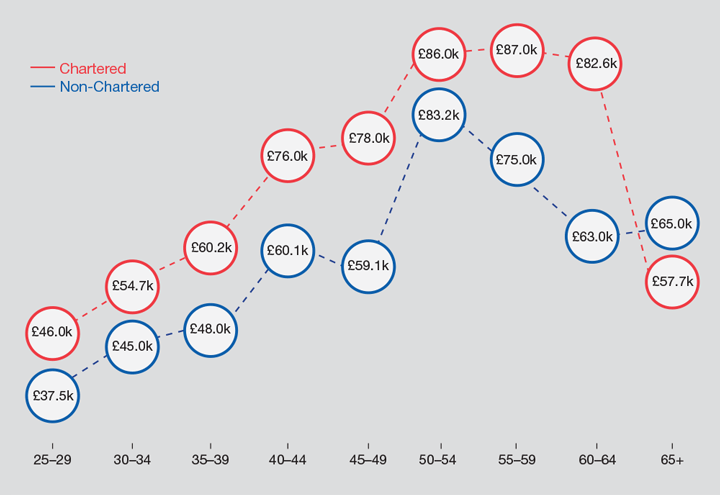
Gender pay gap
For UK members, the median salaries for women are similar to male counterparts in the earlier stages of their careers. However this gap widens from the age of 30. The median salary for females aged 30-34 is almost £6,000/y less than their male counterparts. Meanwhile the median salary for men aged 55-59 is £36,000/y more than women. The sample size for older female engineers is smaller and caution is advised in interpreting these findings.
Regional differences
Significant variations in earnings are visible across the UK. The highest paid chemical engineers are found in the South East with median salaries of £67,300/y – an increase from £65,000/y in 2016. Survey participants based in Scotland (£54,750/y) and North West (£54,748/y) reported the next highest median salaries. Meanwhile the lowest paid chemical engineers can be found in Northern Ireland, where a median of £46,800/y was reported.
The highest number of survey respondents came from the South East – where the top employment sectors are oil and gas exploration and production, industrial gases, and pharmaceuticals and personal care products. Scotland had the second highest concentration of chemical engineers – with 46% of participants working in the oil and gas exploration and production sector. The majority of those in the North West can be found working in power generation or nuclear decommissioning.
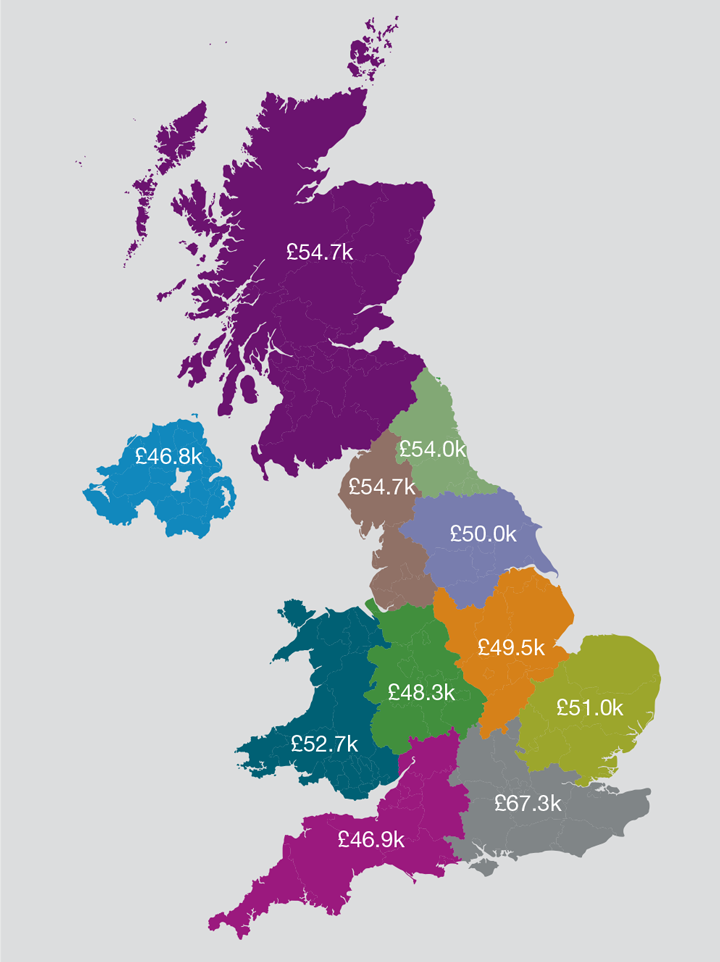
Nationality
For the first time, IChemE’s Salary Survey asked participants their nationality. The findings revealed that UK nationals living in Great Britain reported a higher median salary (£56,400), compared to EU nationals (£45,700) and non-EU nationals at (£44,000) residing there. However, earnings differed slightly when comparing the same age cohort. For example, EU nationals aged 25-29 reported a marginally higher median salary (£39,575) compared to the same aged UK nationals (£39,000) and Non-EU nationals (£38,750).
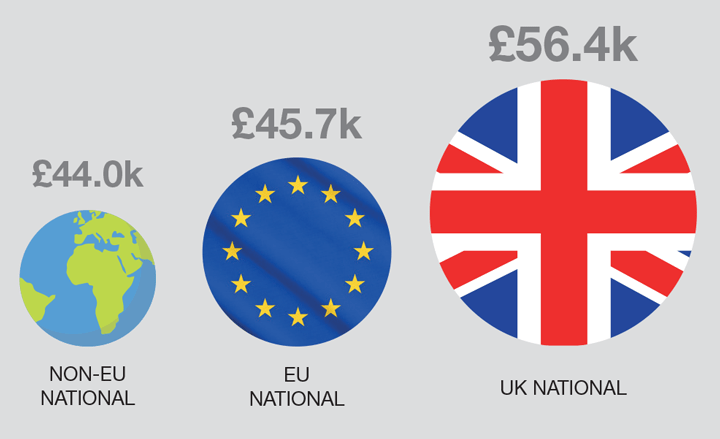
Australia
Due to lower participation levels in Australia, only a limited analysis is possible, and the findings should be treated with caution.
For chemical engineers in Australia, the median salary was reported at A$136,000. This has fallen slightly from 2016 (A$140,000).
The median salary for Chartered Members dropped to A$171,600 (2016: A$180,000). The earnings of non-Chartered members also decreased slightly to A$105,000 from A$110,500 in 2016.
Senior engineers or senior lecturers in Australia earn a median salary of A$142,000 – lower than the A$150,000 reported in 2016. Similarly, those working as either a manager, site manager, project manager, professor, associate professor or principal engineer are earning less than last year. Members in these roles completing the survey in 2017 reported a median salary of A$182,500 - down A$5,000 from 2016.
Pay differences by gender
The median salary for men in Australia is A$150,000, this is markedly higher than the equivalent figure for women (A$110,664). However, as 78% of respondents were male, caution is advised on the interpretion of these results. Broken down by age, male Australian chemical engineers consistently out-earn their female counterparts. Men aged 25-29 earn almost A$5,000 more than women in the same age bracket. This pay gap rises significantly in the 40-44 age category where women reported earning A$155,000, while the median male salary was A$190,000 – a A$35,000 gap.
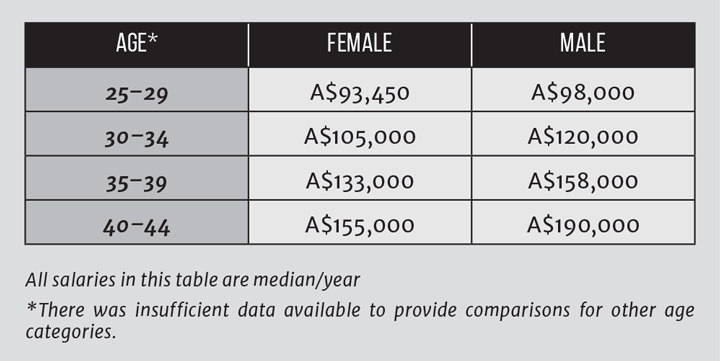
Regional variations
This year shows some strikingly different earnings by state in Australia. Chemical engineers in Western Australia reported the highest earnings with A$180,000, while their counterparts in Victoria lagged behind on A$108,950.
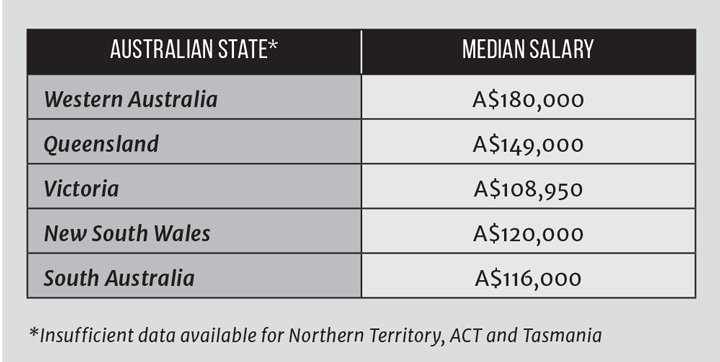
Other benefits
The employment benefits received across all countries were broadly the same. Most respondents benefitted from pension schemes. Other high-ranking benefits included health insurance, bonus schemes and performance-related pay. Many employers cover IChemE subscription fees, a clear indicator of the value of IChemE membership in the corporate community.
In the UK 26% of members reported having a defined benefit or company final salary scheme (down from 30% in 2016). While 66% of members have a defined contribution pension scheme or company money purchase scheme that they contribute to - a slight increase from 60% in 2016. The latter was fairly evenly spread across age categories between Under 25 to 55-59. Three-quarters of participants reported that their employer paid their IChemE membership fees and 62% had their health insurance paid.
Chemical engineers continue to sit near the top of the earnings league table and the diversity of employment sectors open to flexible and forward-looking graduates suggests that the discipline will remain an attractive choice of study for the foreseeable future
93% of respondents from Australia reported superannuation as a benefit – employers are paying into a fund for a future pension. 53% of Australians taking the survey this year reported that their employer pays for their IChemE membership fees and 9% received health insurance as a benefit from their employer.
The impact of the global downturn in 2008 and the subsequent collapse in oil and gas prices continues to depress employment prospects for chemical engineers and earnings growth has been modest over the last decade as a result.
However, chemical engineers continue to sit near the top of the earnings league table and the diversity of employment sectors open to flexible and forward-looking graduates suggests that the discipline will remain an attractive choice of study for the foreseeable future.
UK Salary Survey 2017 report

The UK survey data has been uploaded onto the online UK salary calculator, which members can access for free at: www.icheme.org/media_centre/salary_survey.aspx
The report can also be downloaded at:
www.icheme.org/uk-salary-survey-report
Recent Editions
Catch up on the latest news, views and jobs from The Chemical Engineer. Below are the four latest issues. View a wider selection of the archive from within the Magazine section of this site.




